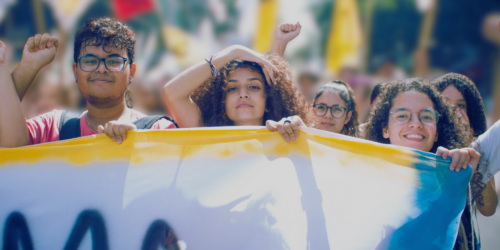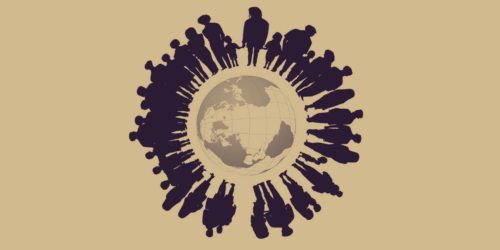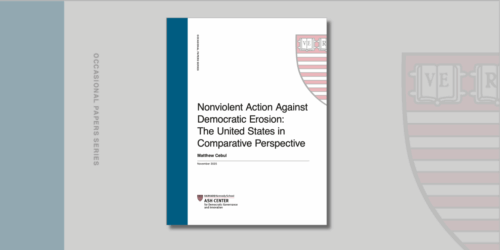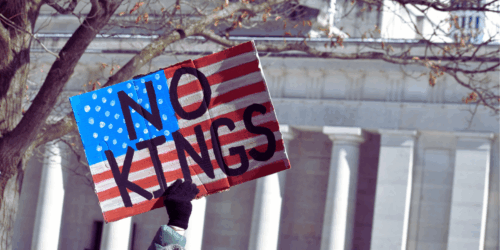
Policy Brief
Why Gen-Z Is Rising
Erica Chenoweth and Matthew Cebul analyze the global surge of Gen Z-led protest movements, showing how economic insecurity, exclusion from power, and corruption are driving youth mobilization worldwide.
Commentary
As the global autocratization crisis deepens, democracy activists have come under increasing stress. In some countries, such as South Korea, Guatemala, and Bangladesh, determined pro-democracy activism has successfully compelled democratic reform or reversed attempted authoritarian takeovers. But mass mobilization for democracy has struggled to overcome prevailing autocratic headwinds in Hong Kong, Georgia, Venezuela, and many other contemporary cases.
Unfortunately, these anecdotes are part of a broader pattern. Recent years have seen a sharp decline in the global success rate of nonviolent democracy movements. Why this is occurring—and in turn, what democracy movements can do to develop effective countermeasures—is one of the most important issues in international politics today. The Harvard University Ash Center’s Nonviolent Action Lab is pursuing several ongoing projects in this domain, including a forthcoming book by Erica Chenoweth.
Given the urgency and importance of these issues, scholars at the NVA Lab and the World Liberty Congress recently convened a summit exploring the potential roots of a global democratic revival. The summit engaged 36 frontline actors in the global struggle for democracy, including activists, scholars, and donor representatives, hailing from 21 countries across five continents. Participants sought to distill the most important causes of authoritarian resilience; identify areas where applied research is needed to investigate these causes; and develop research priorities that could inform a collective, coordinated response.
An extended report on these themes and corresponding recommendations is in development. Here, we synthesize a few core insights.
For the summit’s core activity, we asked participants to triage an initial list of 126 potential sources of authoritarian resilience, drawn from existing research and NVA Lab analysis of global trends. From these discussions, participants collectively synthesized what they see as the most urgent concerns for modern democracy movements, and built consensus around the following top five strategic priorities.
1. Fragmentation and Coalition Building of Pro-Democracy actors
A fundamental challenge for counter-authoritarian movements is that democratic forces are often highly fragmented. Democracy’s allies can be divided across borders, by socioeconomic or political cleavages, between civil society and formal political actors, and over competing visions for the future. If these divisions are acrimonious, they can impede effective coordination around resistance to authoritarianism, making it far easier for autocrats to expand and consolidate control. Autocrats have long employed divide-and-rule strategies, and for good reason—fragmentation and division are the bane of collective action.
The most urgent priority for democratic revival, then, is pro-democracy coalition building. To build power, pro-democracy actors must foster strategic alliances across civil society, political actors, the private sector, religious institutions, and more. In some cases, pro-democracy actors may resist collaboration with potential allies with whom they disagree on other issues or have clashed in the past. But coalition building does not require unanimity; it requires an articulation of shared goals and a willingness to adapt to the circumstances at hand. Helping democracy movements to cultivate coalitions and coalition-building skills will be crucial in the years ahead.
2. Tactical Stagnation
While mass protest remains a vital tool, many democracy movements have been trapped in cycles of mobilization without ever achieving durable change. Erica Chenoweth argues that modern nonviolent movements are less successful in part because they are over-reliant on both street protests and digital organizing. Autocrats have learned to exploit vulnerabilities in these tactics, and movements that lack a deeper strategic approach are struggling to adapt.
In response, movements must engage the full range of nonviolent action’s diverse tactical repertoire, getting creative as they employ other organizational approaches and different tactics of noncooperation and disruption. Movements should think strategically about how best to influence key regime pillars of support in order to encourage defections. Movements must also focus on developing durable, lasting shifts in power, which typically requires prolonged struggle, not one-off street protests.
3. Authoritarian Legitimacy
Modern autocrats have adapted to the global democratizing pressures of democracy’s Third Wave, and have learned how to reliably manufacture regime legitimacy. Competitive authoritarian regimes hold elections, allowing them to maintain the veneer of democratic will even as they rig the scales. More recently, wannabe autocrats have learned to use outsider populist appeals to discredit existing democratic institutions as corrupt and impotent, cloaking their attacks on democracy under veils of democratic reform. Autocratizing rulers effectively perform narratives of reform, stability, and order, and are outcompeting liberal democratic opponents—in fact, some are quite popular.
Democracy’s allies must respond to these legitimacy challenges by rethinking how they talk about democracy to the public. They must develop strategies to participate in or otherwise mobilize around elections even if they are expected to be unfair, maximizing the opportunity to build rapport with citizens and expose autocratic regime weaknesses. They must redefine democracy not as an abstract set of procedures, but as a system of governance that best aligns with popular values and delivers on its aspirations. And democracy movements should learn from their competitors, embracing calls for responsive governance and to reform democratic institutions that have failed in the past, rather than reflexively defending broken systems.
4. Global Autocratic Alliances vs. Weak Movement Support Ecosystems
Authoritarian regimes are well resourced and coordinated, often cooperating to repress democracy activists and reinforce each other against external pressures. In contrast, democracy movements are comparatively isolated and under resourced. Movements need training and mentorship, mental health support, strategic guidance, and more, but many lack funding and support, both within their own countries and from the international community.
In response, democracy’s allies must build more vibrant movement support ecosystems. Networks of NGOs, scholars, civic groups, and philanthropies must emerge to better support democracy movements. Others have begun this work, bringing together democracy’s global allies at events like Berlin Freedom Week. Convening participants agreed that global scholars, donors, activists, and practitioners must work together to develop a new toolkit of evidence-based best practices for democratic resilience, and to share that knowledge widely with the democracy advocacy community.
5. Disinformation and Narrative
The growing deluge of disinformation and propaganda is a pernicious threat to modern democracy movements. Autocrats have adapted to the internet and digital media ecosystems, and many now run sophisticated disinformation campaigns that crowd out or counteract pro-democracy voices. Autocrats have enhanced their control over digital space, undercutting movements’ technological edge and undermining a model of mass mobilization that depends primarily on internet outreach for engagement and persuasion.
Democracy movements must therefore regain control of the narrative, finding new ways to combat disinformation, reach new audiences, and establish credibility. Activists must continually innovate in today’s digital information wars, developing intentional strategies to garner and retain media attention. Independent media has a crucial role to play in the disinformation era, but even when they have access to clear lines of communication, activists must be sure to ground their activities in shared values that resonate broadly. Positive narratives of peaceful, democratic change can not only counter propaganda but also reignite imagination, connection, and commitment to democratic ideals.
Navigating An Unfriendly World for Democracy
Beyond these strategic priorities, convening participants also discussed the challenge of growing global impunity for anti-democratic behavior. International accountability mechanisms for democratic reforms—naming and shaming, sanctions regimes, etc.—are weaker now than in years past. As the liberal international order erodes and western democracies cut back on democracy assistance, democracy movements are becoming even more vulnerable to extreme repression.
For global democracy to reach its full potential, the global democratic order must be revitalized. Democracy’s allies must pursue new forms of global accountability, forging renewed transnational pro-democracy coalitions and confronting autocratic influence at the international level. But even if such a revival were to occur, it would take time, and broader shifts in the international balance of power are largely out of any one movements’ control. For the time being, then, democracy movements will have to learn to adapt to a less favorable international environment—a harsh reality, and one that makes it even more imperative to address the strategic priorities discussed above.
Ultimately, the world’s democracy movements can no longer afford to fight authoritarianism with outdated tools and siloed campaigns. We need coordinated, evidence-based, and activist-informed action that directly responds to the challenges that modern democracy movements now face. Some forces lie beyond activists’ control. But there is much that they can do to tip the scales back in their favor, and we hope to see movements making inroads on these strategic priorities in the years to come.
Freddy Guevara currently works as a research fellow at the Nonviolent Action Lab. He previously worked as a research fellow for the Democracy in Hard Places Initiative and graduated from the Harvard Kennedy School Mid-Career Masters in Public Administration program in 2024. Cortez is a Venezuelan political leader and democracy advocate who co-founded Voluntad Popular. As a result of his political activism, Guevara became a target of political persecution, resulting in the loss of his freedom for three years.
Matthew Cebul is the Lead Research Fellow for the Ash Center’s Nonviolent Action Lab, where he conducts applied research on the dynamics of contemporary nonviolent protest movements, especially in eroding democracies.
The views expressed in this article are those of the author(s) alone and do not necessarily represent the positions of the Ash Center or its affiliates.
Policy Brief
Erica Chenoweth and Matthew Cebul analyze the global surge of Gen Z-led protest movements, showing how economic insecurity, exclusion from power, and corruption are driving youth mobilization worldwide.
Occasional Paper
In this report, Matthew Cebul, Lead Research Fellow for the Nonviolent Action Lab, examines the effectiveness of nonviolent action movements in supporting democratic resilience globally. Identifying challenges faced by nonviolent pro-democracy movements, Cebul offers key takeaways for combating accelerating democratic erosion in the US and abroad.
Article
As organizers for No Kings 2 seek historic turnout on October 18, the broader pro-democracy movement has already broken new ground.
Policy Brief
Erica Chenoweth and Matthew Cebul analyze the global surge of Gen Z-led protest movements, showing how economic insecurity, exclusion from power, and corruption are driving youth mobilization worldwide.
Occasional Paper
In this report, Matthew Cebul, Lead Research Fellow for the Nonviolent Action Lab, examines the effectiveness of nonviolent action movements in supporting democratic resilience globally. Identifying challenges faced by nonviolent pro-democracy movements, Cebul offers key takeaways for combating accelerating democratic erosion in the US and abroad.
Article
In this op-ed, Liz McKenna examines the second ‘No Kings’ protest on October 18 and offers strategies for translating successful protest movements into influential policy change. She emphasizes the importance of sustained organizational efforts alongside protest activity to engage actors across partisan lines, building a broad coalition and a durable base for the movement.



